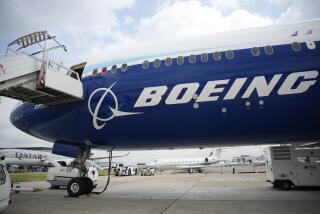Allâs Well at Rockwell : Leaner Firm Envisions Huge Growth Potential
The new Rockwell International, when it is stripped of the defense and aerospace units that once defined it, would be a $10-billion-a-year company with virtually no debt, more than $800 million in cash and a big appetite for acquisitions.
Donald R. Beall, chairman and engineer of the Seal Beach-based companyâs 10-year transformation from defense contractor to commercial conglomerate, said he can leverage Rockwellâs finances to give him â$4 billion in firepower.â
If the $3.2-billion sale to Boeing is completed this fall, analysts said, Rockwell will probably start looking for acquisitions to expand its remaining businesses: factory automation systems, aircraft avionics and communications gear, semiconductors and automotive parts.
Though much less glamorous than the Rockwell-built space shuttles, the businesses are steady, profitable units that--in Rockwellâs opinion--have much brighter growth prospects than space and defense.
Beall declined Thursday to speculate about potential acquisitions.
But analysts said Rockwell wants to hook up with strong performers in at least three of the four industries in which it remains a major player.
Targets are likely to be telecommunications companies, notably those in the rapidly developing field of wireless and multimedia communications; industrial automation businesses; and firms developing electronic and satellite-based guidance systems for commercial aircraft and other applications.
The one business not likely to grow is Rockwellâs Michigan-based automotive parts unit--the original Rockwell business dating from 1919. Itâs profitable and can provide a steady flow of cash, but the cyclical nature of the auto-parts industry argues against expanding it right now, analysts said.
Beall is also expected to look for more acquisitions overseas to increase Rockwellâs global reach. The units that will remain with Rockwell after the Boeing sale already count on foreign markets for 43% of their sales.
*
Rockwell also hopes to boost its presence in the semiconductor market, which now provides 26% of the ânewâ Rockwellâs annual profits.
Its Newport Beach-based semiconductor unit is its fastest-growing business, with sales expected to top $1 billion this year.
The group already supplies about 70% of the modem chip sets used in fax machines and personal computers worldwide, and it recently introduced chips for the cordless telephone and other wireless communications markets.
Rockwellâs recent acquisition of Brooktree Corp. is âa tangible exampleâ of just the kind of companies Rockwell is looking for, Beall said. The San Diego semiconductor firm designs chip sets for processing graphics, sound and data for personal computers.
Then there is the companyâs Collins Avionics unit in Cedar Rapids, Iowa, which is developing a system that enables farmers to map their land with pinpoint accuracy.
The system uses the same satellite-based global position-finding and mapping technologies employed in steering âsmartâ bombs during the Persian Gulf War. Farmers can use the technology to improve crop yields and cut costs by customizing seeding, irrigating and fertilizing programs to fit the varying soil conditions on their acreage.
Rockwell has reinvented itself a number of times since its early years in Michigan, when its major products were truck axles and brake systems.
By the mid-1960s, Rockwell had merged with several other industrial companies and become Rockwell-Standard Corp., a Pittsburgh industrial machinery maker.
In 1967, the Pittsburgh company bought Southern Californiaâs North American Aviation, named itself North American Rockwell and moved its headquarters to El Segundo.
*
The company quickly became a major player in the defense and space industries, landing plum contracts for rocket engines, jet fighters, military missiles and ultimately, the prestigious space shuttle and B-1 bomber programs.
But in the mid-1980s, Beall said, Rockwell decided that its government businesses were not likely to provide much growth. So Rockwell then began diversifying again, buying the Allen-Bradley factory automation company and aggressively investing in electronics.
(BEGIN TEXT OF INFOBOX / INFOGRAPHIC)
Boeing Gets a Piece of Rockwell Boeing Co. plans to buy most of Rockwell International Corp.âs space and defense operations for $3.2 billion. Hereâs a snapshot of what the deal means:
* For Rockwell: Clear sailing to focus on its commercial electronics, automation and vehicle groups; a virtually debt-free balance sheet; annual sales drop to $10 billion from $13 billion.
* For Boeing: Gives its defense and space group a huge boost; further smooths out periodic drops in Boeingâs jetliner business; but Boeing assumes $2.2 billion of Rockwell debt.
* For Rockwell workers: Boeing plans no major layoffs for the 21,000 workers it will acquire; nor does it plan to close plants. Boeing moves into Rockwellâs Seal Beach headquarters.
* For Rockwell stockholders: Rockwellâs holders get as-yet unspecified amount of Boeing stock valued overall at $860 million.
* For Southern California: Boeing assumes Rockwellâs role as a linchpin of the regionâs aerospace industry; Rockwell to move headquarters to as-yet undecided city in region.
What Boeing Will Get
Major products that Boeing will acquire with the purchase of Rockwellâs defense and aerospace businesses:
* Intercontinental ballistic missile systems, tactical missles and sensors.
* B- 1B bomber support; commercial air frames; aircraft and helicopter modifications.
* Rocket propulsion, including space shuttle main engine, space station electric power, airborne laser and electro- optics, space shuttle integration, logistics and operations.
* Global Positioning System satellites; space defense and advanced programs.
(BEGIN TEXT OF INFOBOX / INFOGRAPHIC)
Aerospace Employment
Consolidation in aerospace and defense in reflected in falling employment.
In millions:
â95: 0.8
* BUYING SPACE
Rockwell plans to sell most of space, defense operations to Boeing. A1
* ON THE DEFENSIVE
Deal would give Boeing more military work, put it in satellites. D2
More to Read
Inside the business of entertainment
The Wide Shot brings you news, analysis and insights on everything from streaming wars to production â and what it all means for the future.
You may occasionally receive promotional content from the Los Angeles Times.










